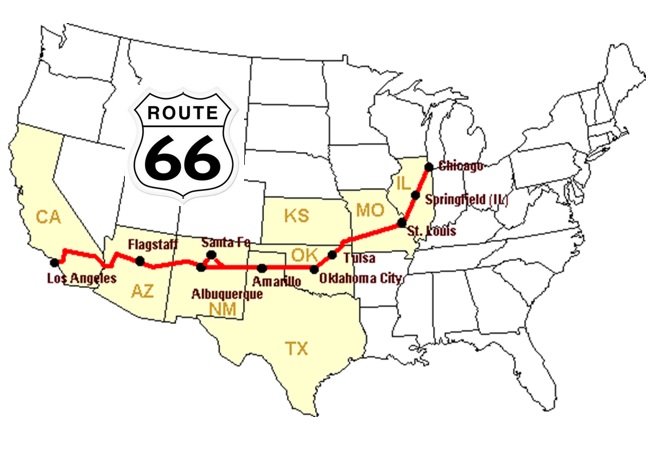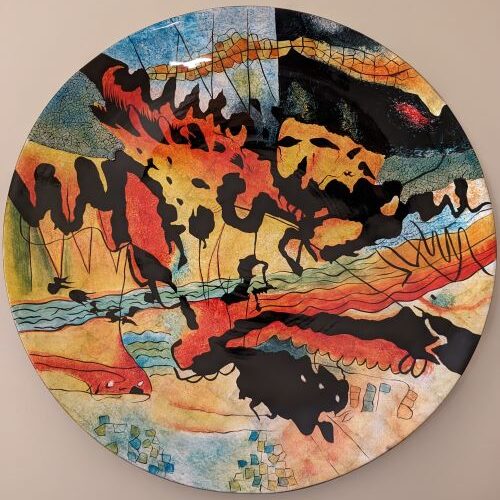
In 1936, we Walkers: Mom, Dad, Mary (17), Tom (16), Jim (6) and Chuck (5), moved from Indiana to a place called Cool Springs, on old US Route 66, located in the eastern foothills of the Black Mountains in west central Arizona, 20 miles west of Kingman, Arizona, and 30 miles east of Needles, California.
Mom and Dad had purchased a filling station business called “Cool Springs Camp” with a cafe and four tourist cabins, the facilities of which they expanded and upgraded mightily, and then re-named it Cool Springs. There was a spring located a mile south of the station site, which provided an abundant supply of fresh, clean water, and from which Cool Springs obtained its water through a gravity feed pipeline from the spring to the station.
During the decade of the 1930s, some states in the middle of the US – Missouri, Arkansas, Oklahoma, and parts of Texas and Kansas – were experiencing continued drought. That area became known as the “Dust Bowl”. The soil on the farms in that area became such that it would no longer produce crops. Over time, Dust Bowl farmers by the hundreds were packing everything they could inside and on top of their cars and trucks, deserting their farms forever, and heading west on what they called “The Mother Road”, Route 66, to find work and to make a new life in California. These folks, regardless of where they had previously lived, were, for the most part, known as “Okies”.
As a result of the exodus from the Dust Bowl during the late 1930s, those of us living at Cool Springs saw an endless caravan of Okies headed west on Route 66. John Steinbeck wrote a book about these folks, “The Grapes of Wrath”. In 1940 the book was made into a movie starring Henry Fonda.
In the book Steinbeck described the Okies as “having everything but the kitchen sink on their cars and trucks, and some of them even had that”. These poor folks had nothing in this world except what they had with them in and on their cars and trucks.
The Okies were not good prospects as customers for Cool Springs. They would buy some gas once in a great while, but only when they really needed it. They had almost no money. Most of those that stopped at Cool Springs did so to use the restrooms, get water for their vehicle radiators, and fill up their drinking water bags.
Dad had built a modern “Customer Toilets” building behind the Café in a desert-park-like area. That toilet facility had a “Men’s” side and a “Women’s” side, each side having a sink with hot and cold running water and bar soap, a flush toilet with toilet paper, and a hot and cold running water shower with bar soap. Whenever the Okies that stopped at Cool Springs discovered that toilet facility, some would ask permission to use the shower. Dad would say, “OK, but be sure and leave it as clean as you found it”.
Dad had a humble background that gave him a soft heart for those who were, in his words, “up-against-it”. Allowing the Okies to use the Cool Spring facilities was overwhelming at times. But Dad managed to handle the situation pretty well. I do not recall anything untoward occurring.
As an aside, my mother-in-law grew up in Kansas and Oklahoma, then came to California in her twenties as a nurse. She smilingly told us that she never saw the movie, “The Grapes of Wrath”, because she was afraid she might see somebody she knew! When our family saw the movie, we were impressed with how realistically it captured the circumstances of the Okies as we knew them!
Will Rogers was quoted as having said, “When the Okies went from Oklahoma to California, the IQ of both states improved”. Sounds like Will Rogers.
All said and done, our Okie experiences on Route 66 in Arizona were meaningful tastes of history for the Walker family.
Copyright © 2024 by Chuck Walker

Very interesting account from a person who really experienced the exodus during the dust bowl days. Touching story to know that Okies were shown kindness along the way to California.